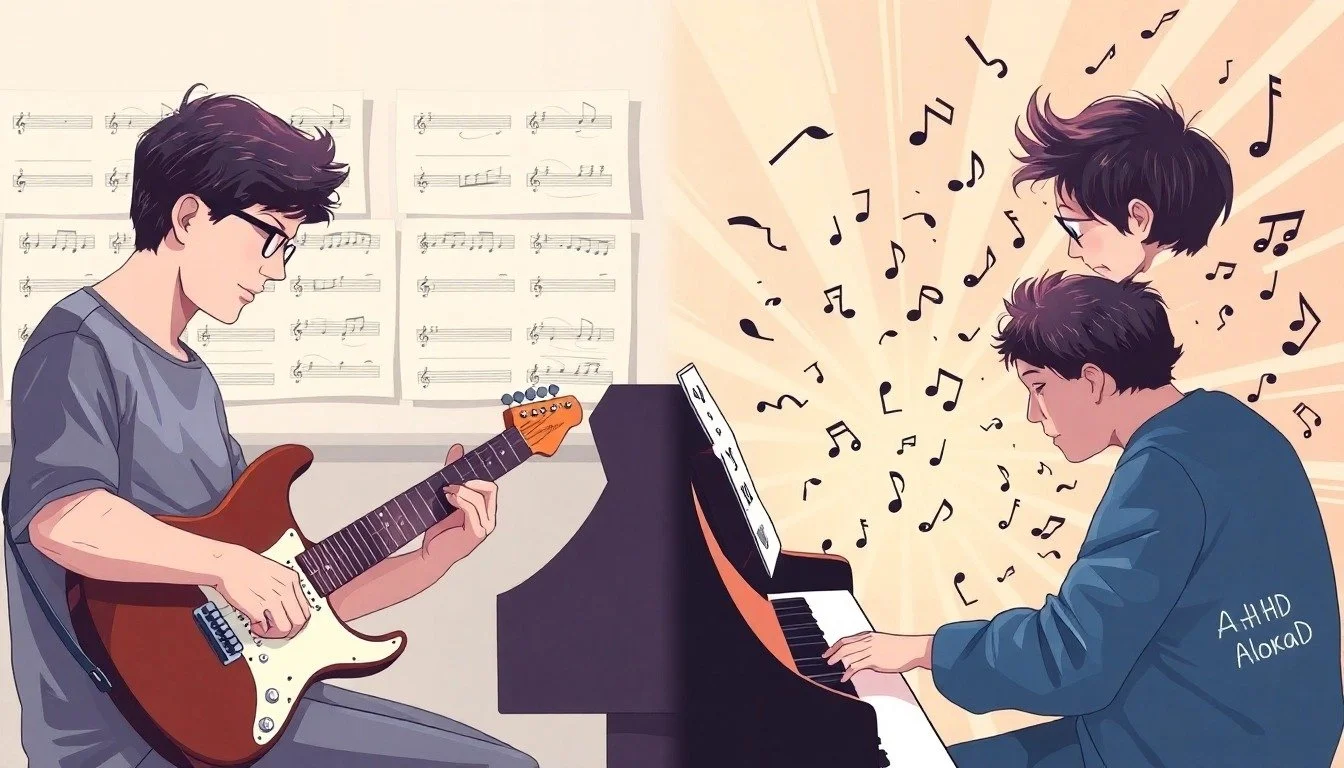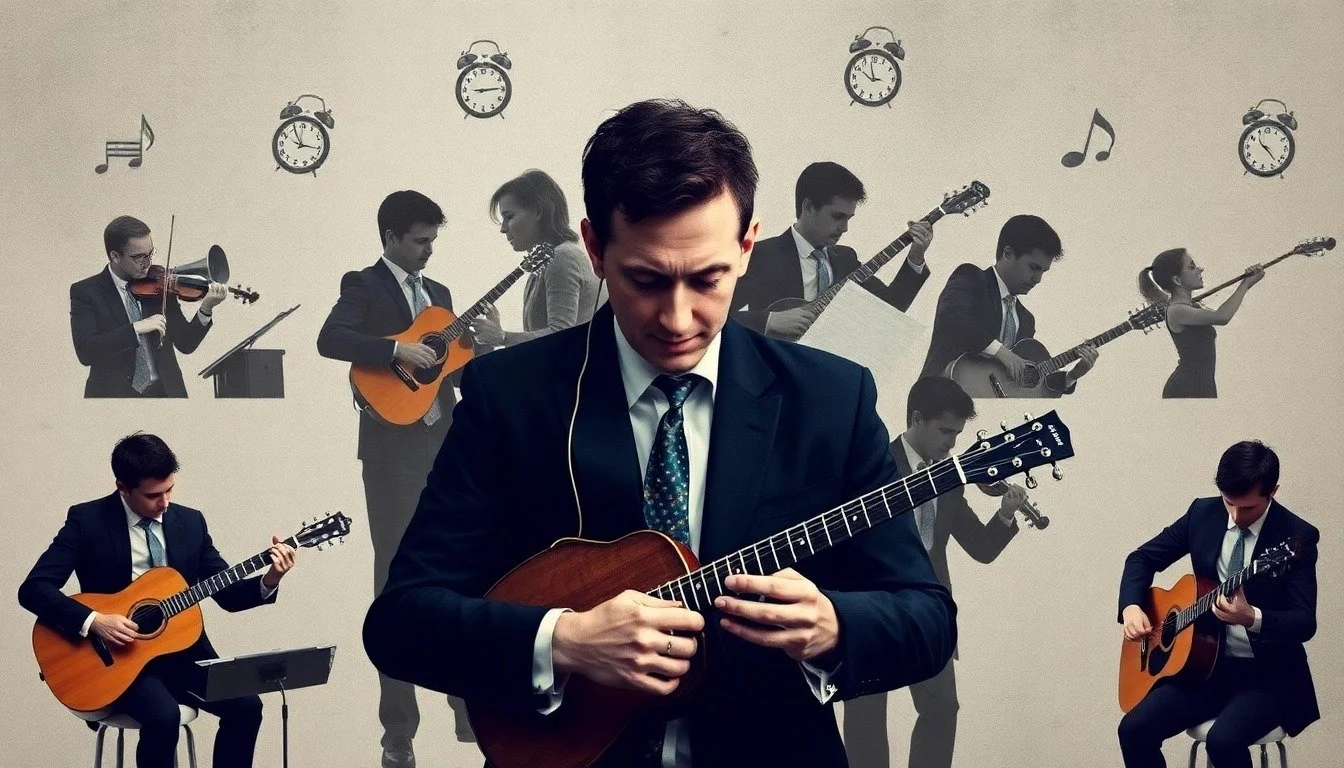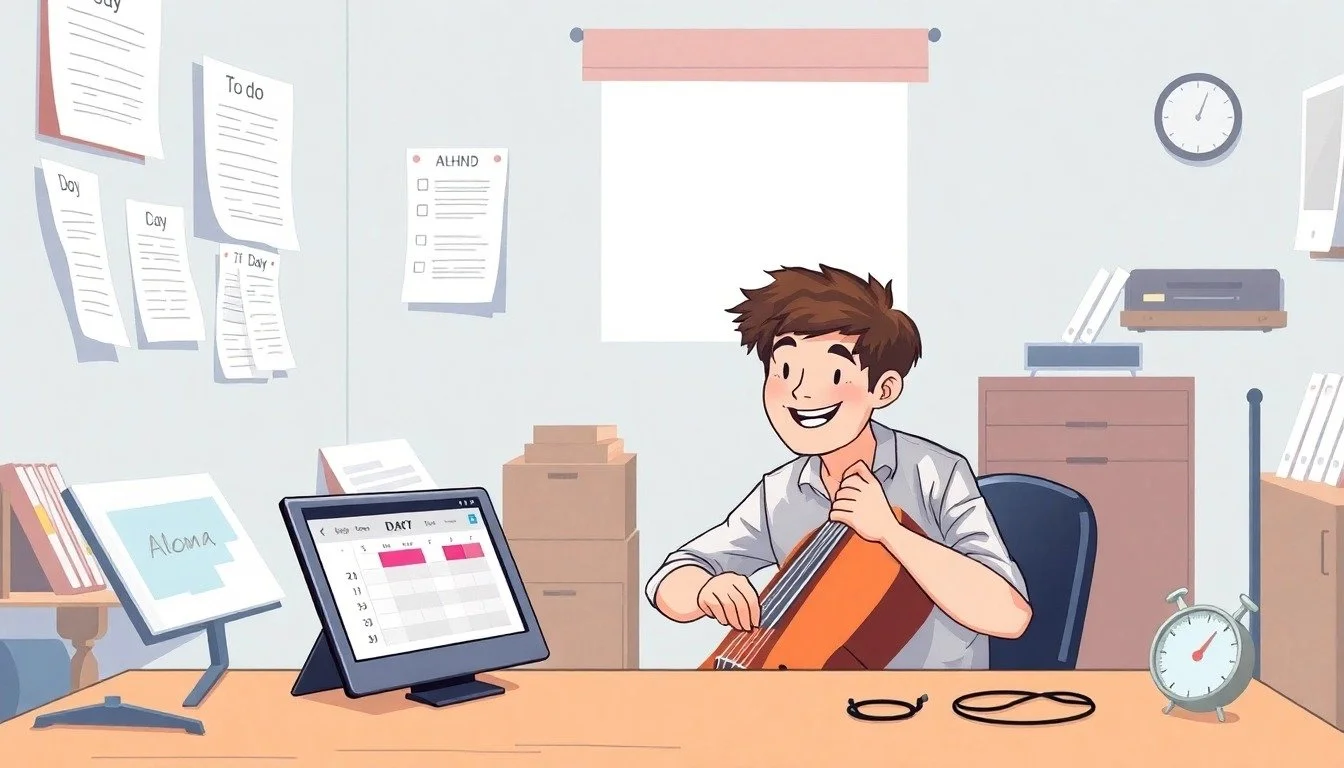Famous Musicians with ADHD: How It Shapes Their Creativity
Music has always been a powerful medium for self-expression, and for some artists, it serves as a unique outlet for managing Attention Deficit Hyperactivity Disorder (ADHD). Musicians with ADHD have made significant contributions to the world of music, showcasing their exceptional creativity and innovative approaches. Their success stories inspire millions, proving that ADHD can be a driving force behind artistic brilliance.
This article delves into the lives of famous ADHD musicians, exploring how their condition shapes their creative process. It examines the advantages ADHD brings to musical composition and performance, as well as the challenges these artists face. By highlighting the experiences of well-known ADHD artists, we aim to shed light on the intricate relationship between ADHD and creativity in the music industry.
Understanding ADHD in Musicians
What is ADHD?
Attention-deficit/hyperactivity disorder (ADHD) is a prevalent neurodevelopmental disorder affecting approximately 2.5% of adults and 5.9% of young people. It is characterized by three core attributes: inattention, hyperactivity, and impulsivity. These traits can manifest as an inability to pay sustained attention, fidgeting, excessive talking, and interrupting others.
ADHD is not a static condition but can vary according to context. It is associated with risks such as school failure, mental health issues, and social difficulties. Additionally, individuals with ADHD may face an elevated risk of substance abuse and accidental injury.
Common Symptoms in Musicians
Musicians with ADHD often experience unique challenges in their professional lives. These may include:
Difficulty maintaining focus during rehearsals
Forgetting important items like sheet music or instruments
Struggling to adhere to practice routines
Impulsively making unflattering remarks to colleagues
Underestimating time needed to arrive at performances or rehearsals
These symptoms can lead to missed professional opportunities and strained relationships with colleagues. However, ADHD can also bring advantages to musicians, such as periods of hyperfocus that enable quick writing and a constant flow of creative ideas.
How ADHD Affects Musical Ability
ADHD can have both positive and negative impacts on musical ability:
Positive Impacts:
Enhanced creativity and innovative thinking
Ability to hyperfocus, leading to intense practice sessions
Restless energy that can be channeled into musical performance
Negative Impacts:
Difficulty in maintaining consistent practice routines
Challenges in learning new instruments or musical pieces
Interestingly, research suggests that ADHD symptoms may be reduced or absent when individuals are engaged in playing and performing music. This indicates that music can serve as a powerful tool for managing ADHD symptoms.
Musicians with ADHD often benefit from structured environments and routines. Breaking tasks into smaller, manageable steps can help maintain focus and reduce overwhelm. Collaboration with producers, managers, or bandmates who can handle administrative tasks allows musicians with ADHD to focus on their creative strengths.
In conclusion, while ADHD presents challenges for musicians, it also offers unique advantages. By understanding and embracing their neurodiversity, musicians with ADHD can harness their creativity and energy to create innovative and resonant music.
Famous Musicians with ADHD
The music industry has seen numerous talented artists who have achieved remarkable success while managing Attention Deficit Hyperactivity Disorder (ADHD). These musicians have not only created exceptional works but have also used their experiences to raise awareness about neurodiversity in the creative field.
Rock and Pop Stars
Many rock and pop stars have openly discussed their experiences with ADHD, showcasing how they've channeled their unique cognitive traits into their music.
Dave Grohl: The Foo Fighters frontman and former Nirvana drummer has been vocal about his ADHD diagnosis. In a YouTube video, Grohl explained how ADHD affected his academic performance, emphasizing that it was not the fault of his school.
Adam Levine: The Maroon 5 lead singer struggled with sitting still, completing work, and focusing - some of the top signs of ADHD.
Will.i.am: The seven-time Grammy Award winner and Black Eyed Peas member describes his tunes as the "most ADHD songs ever." He has shared that working on music helps him manage his ADHD symptoms and keep his mind focused. Will.i.am explained, "One thing I learned about ADHD is that it's hard to keep your attention, and you can't sit still and you're always moving and thinking about a whole bunch of things. But those traits work well for me in studios and in meetings about creative ideas."
Solange Knowles: The Grammy-winning singer and songwriter initially doubted her ADHD diagnosis until a second doctor confirmed it. Her experience highlights the importance of seeking professional opinions.
Classical Composers
Interestingly, some experts have suggested that even historical classical composers might have had ADHD, based on accounts of their behavior and work habits.
Gustav Mahler: ADHD expert Dr. Ulrich Muller-Sedgwick, after extensive research, concluded that there's good evidence the great composer might have had ADHD. Mahler was described as untidy, erratic, forgetful, and absent-minded, yet he was also a creative genius.
Wolfgang Amadeus Mozart: A 2007 paper by Aidin Ashoori and Joseph Jankovic pointed to several elements of Mozart's behavior that may indicate the presence of ADHD during his childhood and extending to his adult years. His notorious impatience and childish behavior have been cited as potential signs.
Hip-hop and Rap Artists
The hip-hop and rap community has also seen a growing discussion around ADHD, with several artists openly addressing their experiences in their music and interviews.
Nicki Minaj: The rapper seemed to confess having ADHD in a tweet, describing her difficulty in expressing herself as "one of the many embarrassing signs of ADHD."
Joyner Lucas: The rapper titled his 2020 debut album "ADHD" and included a song of the same name. In the track "ADHD With Revenge Intro," Lucas sings, "I feel like I'm dying inside / Why do I seem crazy? / Someone save me / You can't blame me / It's my ADHD."
Chance the Rapper: He is said to have had Attention Deficit Disorder, now considered the "inattentive" subtype of ADHD.
Kendrick Lamar: His 2011 classic "A.D.H.D." addresses themes related to the condition, although it's unclear if Lamar himself has been diagnosed.
These artists' experiences demonstrate that ADHD, while presenting challenges, can also contribute to unique creative perspectives and innovative approaches in music. Their openness about their condition has helped to destigmatize ADHD and inspire others in the music industry and beyond.
The Creative Advantages of ADHD in Music
Hyperfocus and Musical Composition
Individuals with ADHD often experience hyperfocus, a state of intense concentration on tasks they find engaging or stimulating. This ability can be particularly advantageous in musical composition. When hyperfocused, musicians with ADHD may experience enhanced working memory, allowing them to recall and manipulate musical ideas with remarkable clarity. This heightened focus can lead to innovative and inspired performances, as the musician becomes deeply immersed in the creative process.
Impulsivity and Improvisation
While impulsivity is often viewed as a challenge for individuals with ADHD, it can be a valuable asset in musical improvisation. The willingness to take risks and try new musical ideas without overthinking can result in fresh and spontaneous performances. This impulsive nature aligns well with the spontaneous nature of improvisation, allowing musicians with ADHD to create unique and compelling musical experiences.
Divergent Thinking and Unique Sound
ADHD is associated with a higher level of divergent thinking, which is the ability to generate creative ideas by exploring many possible solutions. This cognitive trait can be particularly beneficial in music creation, as it allows musicians to think outside conventional boundaries and create unique sounds.
Research has shown that individuals with ADHD excel at divergent thinking tasks, such as inventing creative new uses for everyday objects or brainstorming innovative features for devices. In the context of music, this ability translates to generating novel musical ideas and exploring unconventional approaches to composition and performance.
A study comparing ADHD and non-ADHD groups on a conceptual expansion task found that ADHD students demonstrated a broader scope of semantic activation, which correlates with enhanced conceptual expansion. This expanded thinking was evident in an "alien fruit" task, where ADHD students created more original and less Earth-like fruits, incorporating atypical features such as antennae, tongues, and hammers.
The innovative thinking style associated with ADHD can be particularly advantageous in fields that value originality and cutting-edge creativity. In music, this can manifest as the ability to create unique sound combinations, experiment with unconventional instruments, or develop entirely new genres.
Musicians with ADHD may find that their condition offers some protection from the constraining effects of existing knowledge. This allows them to approach music creation with fewer preconceived notions, potentially leading to more innovative and boundary-pushing compositions.
It's important to note that while ADHD can present challenges in environments requiring sustained attention, the same traits that may cause difficulties in structured settings can become strengths in creative fields like music. The distractibility and chaotic mind often associated with ADHD can give musicians an edge when it comes to original thinking and breaking free from conventional models.
By embracing and channeling these unique cognitive traits, musicians with ADHD can harness their creativity to produce innovative and compelling music that pushes the boundaries of traditional composition and performance.
Challenges and Coping Strategies
Time Management and Practice Routines
Musicians with ADHD often face unique challenges in managing their time and maintaining consistent practice routines. Many find that they function better in an uncluttered environment, as clutter can trigger distractions. To address this, some musicians take a few minutes at the end of each day to tidy their workspace, ensuring a clean slate for the next practice session.
Establishing a structured routine can be beneficial for musicians with ADHD. Some find success in scheduling power naps between activities, using alarms to manage time, and practicing during their most productive hours. For instance, one musician reported that early morning practice sessions, between 7:30-8:30 AM, were most effective for them.
To stay organized, many musicians with ADHD utilize digital tools. Google Tasks can be used to create and categorize to-do lists, while Google Calendar helps with scheduling and setting reminders for important events and deadlines. Advance preparation, such as reviewing the next day's schedule and laying out clothes the night before, can also help manage time more effectively.
For more information on strategies for managing ADHD symptoms effectively, you can visit our article on managing ADHD clutter and anxiety.
Performance Anxiety and ADHD
Performance anxiety is a common challenge for many musicians, and it can be particularly intense for those with ADHD. According to a survey of over 2,000 professional musicians, 24% reported suffering from stage fright. The pressure to perform, excessive arousal, and concerns about inadequate preparation are among the most common causes of music performance anxiety (MPA).
To cope with performance anxiety, musicians with ADHD can employ various strategies:
Preparation: Thorough practice is crucial for building confidence.
Relaxation Techniques: Controlled breathing, meditation, and biofeedback can help manage anxiety.
Positive Visualization: Imagining a successful performance can help redirect negative thoughts.
Physical Activity: Light exercise before a performance can help ease anxious feelings.
Audience Connection: Making eye contact and thinking of the audience as friends can reduce anxiety.
If you are interested in understanding how ADHD can affect relationships, explore our article on enhancing relationships with heart-based thinking for ADHD.
Conclusion
The exploration of ADHD in famous musicians sheds light on the unique advantages and challenges faced by these artists. Their stories highlight how ADHD has an influence on creativity, leading to innovative approaches in music composition and performance. These musicians' experiences show that, with the right strategies and support, ADHD can be channeled into a powerful creative force, inspiring others to embrace their neurodiversity and pursue their passions.
As we've seen, managing ADHD in the music industry involves a combination of personal strategies, professional support, and creative adaptations. From establishing structured routines to seeking therapy and medication when needed, musicians with ADHD have found ways to thrive in their careers. Their success stories serve as a testament to the potential for greatness that lies within neurodiversity. To learn more about harnessing your own creative potential, BOOK YOUR SESSION TODAY!
FAQs
1. How does ADHD impact musicians during their practice sessions?
While there is limited research specifically focusing on musicians with ADHD, available studies and personal accounts suggest that these individuals might require additional stimuli while practicing, such as having the TV on in the background.
2. Do individuals with ADHD possess musical talents?
Research indicates that children and adolescents diagnosed with ADHD often experience challenges in complex auditory processing and musical performance compared to their peers without ADHD.
3. Which famous music artists have ADHD?
Several renowned musicians have achieved success despite challenges like ADHD, dyslexia, and dyscalculia. Notable artists include Adam Levine and Solange Knowles with ADHD; Carly Simon, Chris Robinson, and Jewel with dyslexia; Eddie Argos with dyspraxia; and both Joe Perry and Steven Tyler with ADHD.





